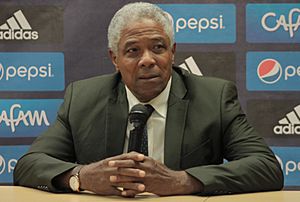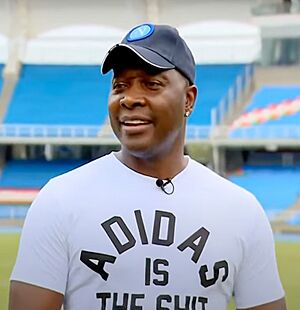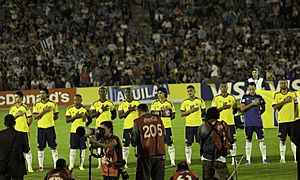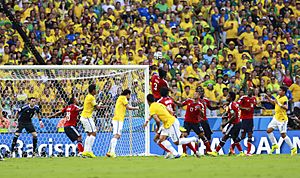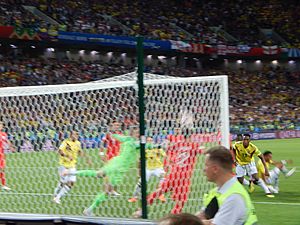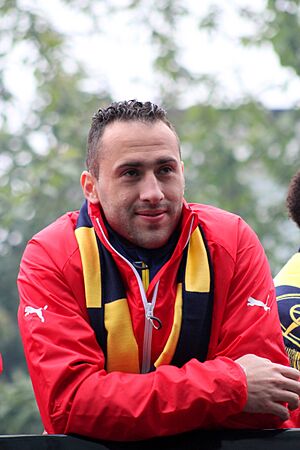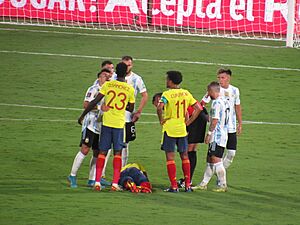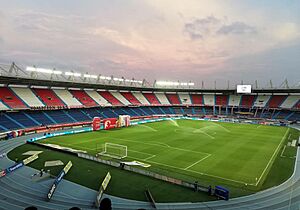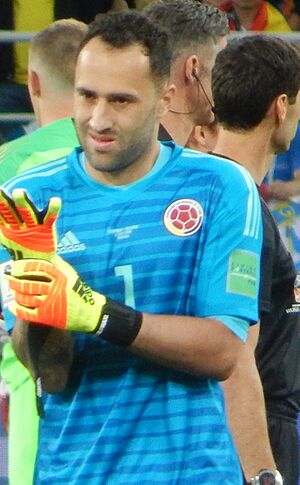Colombia national football team facts for kids
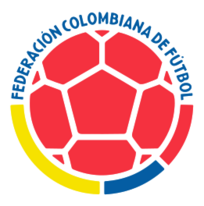 |
|||||||||||||||||||||||||||||||||||||||||||||||||||||||||||
| Nickname(s) | Los Cafeteros (The Coffee Growers) La Tricolor (The Tricolour) La Sele (The Sele) |
||||||||||||||||||||||||||||||||||||||||||||||||||||||||||
|---|---|---|---|---|---|---|---|---|---|---|---|---|---|---|---|---|---|---|---|---|---|---|---|---|---|---|---|---|---|---|---|---|---|---|---|---|---|---|---|---|---|---|---|---|---|---|---|---|---|---|---|---|---|---|---|---|---|---|---|
| Association | Federación Colombiana de Fútbol (FCF) | ||||||||||||||||||||||||||||||||||||||||||||||||||||||||||
| Confederation | CONMEBOL (South America) | ||||||||||||||||||||||||||||||||||||||||||||||||||||||||||
| Head coach | Néstor Lorenzo | ||||||||||||||||||||||||||||||||||||||||||||||||||||||||||
| Captain | James Rodríguez | ||||||||||||||||||||||||||||||||||||||||||||||||||||||||||
| Most caps | David Ospina (128) | ||||||||||||||||||||||||||||||||||||||||||||||||||||||||||
| Top scorer | Radamel Falcao (36) | ||||||||||||||||||||||||||||||||||||||||||||||||||||||||||
| Home stadium | Estadio Metropolitano Roberto Meléndez | ||||||||||||||||||||||||||||||||||||||||||||||||||||||||||
| FIFA code | COL | ||||||||||||||||||||||||||||||||||||||||||||||||||||||||||
|
|||||||||||||||||||||||||||||||||||||||||||||||||||||||||||
| FIFA ranking | |||||||||||||||||||||||||||||||||||||||||||||||||||||||||||
| Current | 12 |
||||||||||||||||||||||||||||||||||||||||||||||||||||||||||
| Highest | 3 (July–August 2013, September 2014 – March 2015, June–August 2016) | ||||||||||||||||||||||||||||||||||||||||||||||||||||||||||
| Lowest | 54 (June 2011) | ||||||||||||||||||||||||||||||||||||||||||||||||||||||||||
| Elo ranking | |||||||||||||||||||||||||||||||||||||||||||||||||||||||||||
| Current | 6 |
||||||||||||||||||||||||||||||||||||||||||||||||||||||||||
| Highest | 3 (June 2016) | ||||||||||||||||||||||||||||||||||||||||||||||||||||||||||
| Lowest | 99 (March 1957) | ||||||||||||||||||||||||||||||||||||||||||||||||||||||||||
| First international | |||||||||||||||||||||||||||||||||||||||||||||||||||||||||||
(Barranquilla, Colombia; 17 February 1926) |
|||||||||||||||||||||||||||||||||||||||||||||||||||||||||||
| Biggest win | |||||||||||||||||||||||||||||||||||||||||||||||||||||||||||
(Riffa, Bahrain; 26 March 2015) |
|||||||||||||||||||||||||||||||||||||||||||||||||||||||||||
| Biggest defeat | |||||||||||||||||||||||||||||||||||||||||||||||||||||||||||
(Lima, Peru; 24 March 1957) |
|||||||||||||||||||||||||||||||||||||||||||||||||||||||||||
| World Cup | |||||||||||||||||||||||||||||||||||||||||||||||||||||||||||
| Appearances | 6 (first in 1962) | ||||||||||||||||||||||||||||||||||||||||||||||||||||||||||
| Best result | Quarter-finals (2014) | ||||||||||||||||||||||||||||||||||||||||||||||||||||||||||
| Copa América | |||||||||||||||||||||||||||||||||||||||||||||||||||||||||||
| Appearances | 24 (first in 1945) | ||||||||||||||||||||||||||||||||||||||||||||||||||||||||||
| Best result | Champions (2001) | ||||||||||||||||||||||||||||||||||||||||||||||||||||||||||
| CONCACAF Gold Cup | |||||||||||||||||||||||||||||||||||||||||||||||||||||||||||
| Appearances | 3 (first in 2000) | ||||||||||||||||||||||||||||||||||||||||||||||||||||||||||
| Best result | Runners-up (2000) | ||||||||||||||||||||||||||||||||||||||||||||||||||||||||||
| Confederations Cup | |||||||||||||||||||||||||||||||||||||||||||||||||||||||||||
| Appearances | 1 (first in 2003) | ||||||||||||||||||||||||||||||||||||||||||||||||||||||||||
| Best result | Fourth place (2003) | ||||||||||||||||||||||||||||||||||||||||||||||||||||||||||
|
Medal record
|
|||||||||||||||||||||||||||||||||||||||||||||||||||||||||||
The Colombia national football team (also known as Selección de fútbol de Colombia) represents Colombia in men's international football. The team is managed by the Federación Colombiana de Fútbol (FCF), which is the main group for football in Colombia. They are part of CONMEBOL, the South American football group.
The team is often called Los Cafeteros, which means "The Coffee Growers." This nickname comes from Colombia's famous coffee production. The national team is a big symbol of pride and passion for many Colombians around the world. Fans are known for being very enthusiastic, and the team's goal celebrations often include fun dances.
Colombia has played in six FIFA World Cups: 1962, 1990, 1994, 1998, 2014, and 2018. Their best World Cup performance was in 2014 in Brazil, where they reached the quarter-finals and finished fifth overall.
Their biggest international win was the Copa América in 2001, when they hosted the tournament. They won every match without letting in a single goal, which was a record! Colombia also finished second in the Copa América in 1975 and 2024. They have also finished third five times: in 1987, 1993, 1995, 2016, and 2021.
The team has also done well in other regional games. They won a gold medal at the Central American and Caribbean Games in 1946 and a bronze in 1938. At the Bolivarian Games, they won gold in 1951 and silver in 1961, 1973, and 1981.
Contents
- History of Colombian Football
- Early Days and First World Cup
- First Copa América Final and Challenges (1963–1979)
- The 1980s: A New Beginning
- The 1990s: The First Golden Era
- The 2000s: Copa América Title and Later Struggles
- The Pékerman Era: A New Golden Generation (2011–2018)
- Recent Years (2019–Present)
- The Néstor Lorenzo Era (2022–Present)
- Team Rivalries
- Home Stadium
- Team Image
- Coaching Staff
- Players
- Individual Records
- Competitive Records
- Head-to-Head Record
- Honours
- Images for kids
- See also
History of Colombian Football
Early Days and First World Cup
Football in Colombia likely started around 1900, brought by English railway engineers. The Colombian Football Federation was created in 1924. It joined FIFA and CONMEBOL in 1936. Colombia played its first international match on February 17, 1926, beating Costa Rica 4–1 in Barranquilla.
In 1937, Colombia put together a national team for the "Games of the IV Centenary of Cali." They played four matches, including against Mexico and Argentina. Colombia did not play in the 1938 FIFA World Cup in France. Instead, they played in the 1938 Central American and Caribbean Games, winning a bronze medal. Fernando Paternoster from Argentina became Colombia's first foreign coach that year.
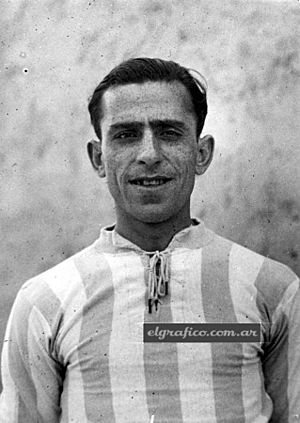
Colombia played in the 1945 South American Championship for the first time, finishing fifth. They won a gold medal at the 1946 Central American and Caribbean Games in Barranquilla, winning all six games.
Colombia did not play in the 1950 FIFA World Cup and was banned from the 1954 FIFA World Cup because of a football league issue called "El Dorado." They made their first World Cup qualifying attempt for the 1958 FIFA World Cup but did not make it.
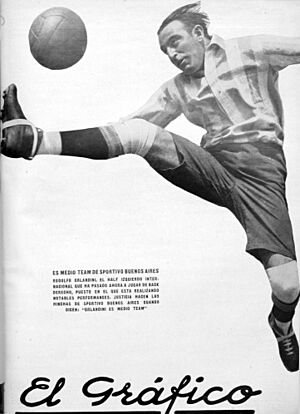
Under Argentine coach Adolfo Pedernera, Colombia qualified for their first-ever World Cup in 1962. They beat Peru to get there.
At the 1962 World Cup, Colombia was in a group with Uruguay, the Soviet Union, and Yugoslavia. They lost their first game to Uruguay. In their second match, they had an exciting 4–4 draw with the USSR. In this game, Marcos Coll scored a special goal directly from a corner kick, which is very rare in World Cup history. Colombia's 1962 journey ended with a 5–0 loss to Yugoslavia.
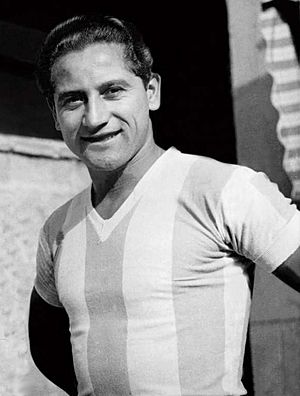
First Copa América Final and Challenges (1963–1979)
After 1962, Colombia faced challenges in qualifying for major tournaments. They finished last in the 1963 South American Championship. They also did not qualify for the 1966 FIFA World Cup or the 1967 South American Championship.
Colombia tried to qualify for the 1970 FIFA World Cup but failed. However, they made history at the 1975 Copa America. They reached the final for the first time, beating Uruguay in the semi-finals. In the final, they played Peru. Colombia won one game and lost another, leading to a deciding match in Caracas, where Peru won.
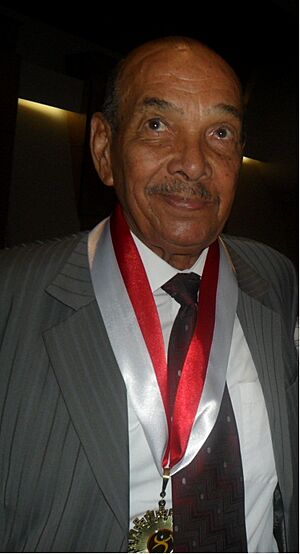
The 1980s: A New Beginning
Before the 1980s, Colombia's national team was not very strong. There wasn't much support for the team due to various problems in the country. Even though they played in the 1962 World Cup, they often struggled.
Colombia did not qualify for the 1982 FIFA World Cup. They also had a tough time in the 1983 Copa América. For the 1986 FIFA World Cup qualifiers, they were in a group with Argentina, Peru, and Venezuela. They started well with a win against Peru but then lost to Argentina. They did not qualify after losing to Paraguay in the play-offs.
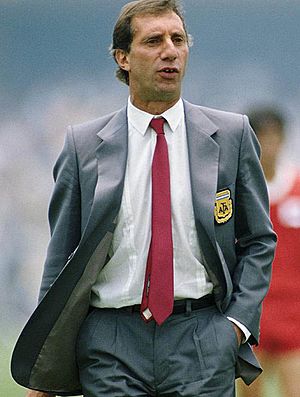
In the 1987 Copa América, Colombia reached the semi-finals but lost to Chile. For the 1990 FIFA World Cup, Colombia qualified for the first time since 1962! They won a play-off against Israel to secure their spot.
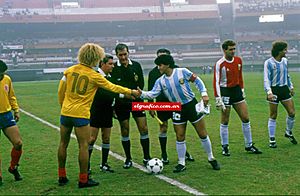
The 1990s: The First Golden Era
At the 1990 FIFA World Cup, Colombia was in a group with Yugoslavia, United Arab Emirates, and West Germany. They won their first World Cup match ever, beating the United Arab Emirates 2–0. They lost to Yugoslavia but then had a famous 1–1 draw with West Germany, with Freddy Rincón scoring a late goal. This draw helped Colombia reach the Round of 16.
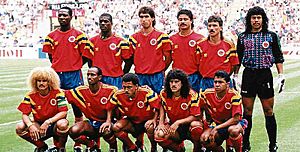
In the Round of 16, Colombia lost 2–1 to Cameroon in extra time after a mistake by goalkeeper René Higuita. Even though they were eliminated, this World Cup showed the rise of Colombia's "first golden generation" of players.
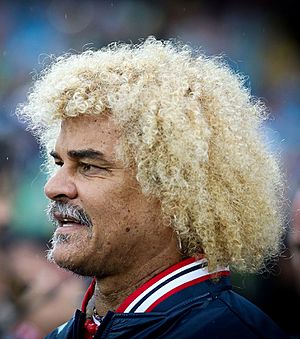
In the 1993 Copa América, with Carlos Valderrama as captain, Colombia reached the semi-finals and finished third.
Colombia had an amazing qualifying campaign for the 1994 FIFA World Cup. They didn't lose a single match, including a historic 5–0 win against Argentina in Buenos Aires. Many people thought Colombia could even win the World Cup because they were playing so well.
At the 1994 FIFA World Cup, Colombia was in a group with the United States, Romania, and Switzerland. They only won one game against Switzerland and lost two, which meant they were out in the group stage. In the match against the United States, Andrés Escobar accidentally scored an own goal. Sadly, Escobar was later murdered in Colombia, which was a very tragic event and marked the end of Colombia's first golden generation.
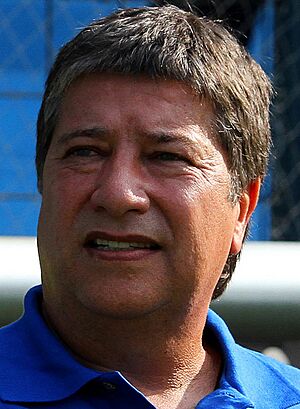
Colombia finished third in the 1995 Copa América. Two years later, they lost in the quarter-finals of the 1997 Copa América.
Colombia qualified for the 1998 FIFA World Cup in France. They were in a group with Tunisia, England, and Romania. They won against Tunisia but lost to Romania and England, which meant they didn't move past the group stage.
In the 1999 Copa América, Colombia won all their group matches but then lost to Chile in the quarter-finals.
The 2000s: Copa América Title and Later Struggles
In 2000, Colombia played in their first CONCACAF Gold Cup in the United States. They reached the final but lost to Canada 2–0.
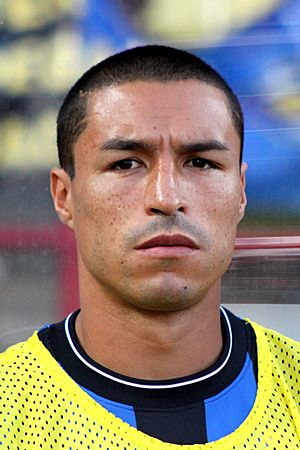
Colombia hosted their first Copa América in 2001. There were some concerns about safety before the tournament, but it went ahead. Colombia started strong, winning their first game against Venezuela. They continued to win all their group matches. They then beat Peru in the quarter-finals and Honduras in the semi-finals. Colombia won their first Copa América title by beating Mexico 1–0 in the final, with captain Iván Córdoba scoring the winning goal. They made history by not letting in any goals throughout the entire tournament!
For the 2002 FIFA World Cup, Colombia did not qualify, missing out by a small margin. This was the first time they hadn't qualified for a World Cup since 1986. However, because they won the 2001 Copa América, Colombia played in the 2003 FIFA Confederations Cup. They reached the semi-finals but lost to Cameroon and then to Turkey, finishing fourth.
In the 2004 Copa América, Colombia lost in the semi-finals and finished fourth. They also played in the 2005 CONCACAF Gold Cup, reaching the semi-finals again.
Colombia did not qualify for the 2006 FIFA World Cup or the 2010 FIFA World Cup. The team struggled with scoring goals and changing coaches often during this period.
The Pékerman Era: A New Golden Generation (2011–2018)
In the 2011 Copa América, Colombia won their group but were knocked out in the quarter-finals by Peru. By the end of 2011, Colombia's FIFA ranking improved a lot.
In October 2012, Colombia returned to the top 10 of the FIFA Rankings for the first time in many years. This was after good wins against Mexico, Chile, and Uruguay.
When José Pékerman became coach in January 2012, the team started to shine. They had a great qualifying campaign for the World Cup, finishing second and making it to the tournament for the first time since 1998. Many people thought Colombia could be a surprise team at the World Cup.
Even though their top scorer Radamel Falcao was injured, Colombia had a fantastic 2014 FIFA World Cup. They won their first game against Greece 3–0. They then beat Ivory Coast 2–1 to secure the top spot in their group. They finished the group stage by beating Japan 4–1, winning all three games. Colombia then defeated Uruguay 2–0 in the Round of 16, reaching the quarter-finals for the first time ever! Their amazing run ended with a 2–1 loss to the host nation, Brazil.
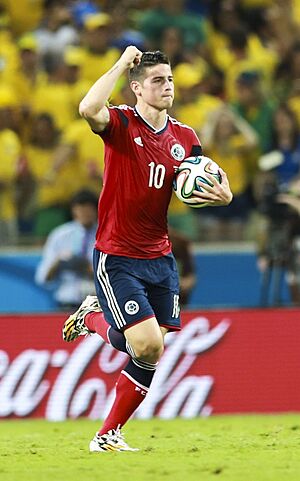
Colombia had a tough 2015 Copa América, winning only one game. They were eliminated by Argentina in a penalty shootout. The next year, in the Copa América Centenario (a special edition of the Copa América), Colombia started well, beating the hosts United States. They reached the semi-finals but lost to Chile. They then won the third-place match against the United States, achieving their best result since winning in 2001.
Colombia qualified for the 2018 FIFA World Cup by finishing fourth in South America. They lost their first game to Japan but then had a big 3–0 win over Poland. They beat Senegal 1–0 to win their group and move to the Round of 16. In a close match, Colombia was knocked out by England after losing 4–3 in a penalty shootout.
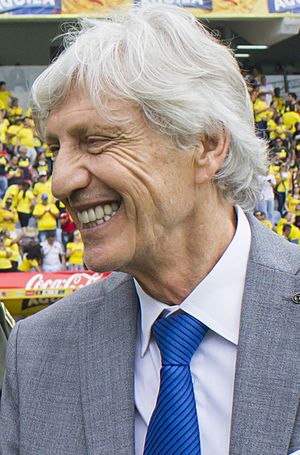
Recent Years (2019–Present)
After José Pékerman left, Carlos Queiroz became the new coach in 2019.
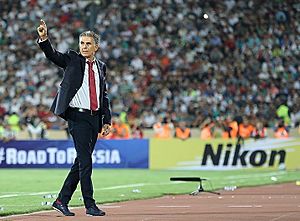
In the 2019 Copa América, Colombia had a great group stage, winning all their matches without letting in any goals. They were the only team since 2001 to do this. However, they were eliminated by Chile in a penalty shootout in the quarter-finals.
Colombia started the 2022 World Cup qualifiers well. But after the COVID-19 pandemic, their performance dropped. They had a big loss to Uruguay at home and a 6–1 defeat against Ecuador. This led to Carlos Queiroz leaving as coach in December 2020. Reinaldo Rueda then returned as coach.
In the 2021 Copa América, Colombia won their first game and then had a draw and two losses. They still qualified for the quarter-finals and beat Uruguay in a penalty shootout. In the semi-finals, they drew with Argentina but lost in a penalty shootout. Colombia then won the third-place match against Peru 3–2, with Luis Díaz scoring two late goals, making him a top scorer of the tournament along with Lionel Messi.
After the Copa América, Colombia continued their 2022 World Cup qualification. They went seven matches without scoring a goal, which hurt their chances. Even though they won their last game against Venezuela, other results meant Colombia finished sixth and did not qualify for the World Cup finals. Rueda then left his coaching role.
The Néstor Lorenzo Era (2022–Present)
On June 2, 2022, the Colombian Football Federation announced that Néstor Lorenzo would be the new coach for the next four years. The federation also started a new project called "Futbol con Futuro" (Football with a Future) to help all national teams succeed.
Under coach Lorenzo, Colombia had an amazing run of 28 games without a loss, which included wins against strong teams like Germany, Brazil, and Spain. This streak ended on July 14, 2024, when they lost to Argentina in extra time in the Copa América final.
Team Rivalries
Colombia vs. Venezuela
Colombia's main football rivalry has always been with Venezuela. For a long time, Colombia usually won easily. However, in recent years, football has become more popular in Venezuela, and the games have become more competitive.
In 2005, Venezuela surprised everyone by beating Colombia 1–0 in Barranquilla during a World Cup qualifier. Former captain Valderrama called it a "classic" and said, "Venezuela tries their best playing against us."
Colombia vs. Argentina
The rivalry between Colombia and Argentina is more about "respect" than strong dislike. Their matches always attract a lot of interest.
Colombia's 5–0 win against Argentina in the 1994 World Cup qualifiers was the first time Argentina had lost a World Cup qualifier at their home stadium. In the 1999 Copa América group stage, Colombia won 3–0, and Argentine striker Martin Palermo famously missed three penalty kicks in that game.
In 2021, during the Copa América semi-finals, there were some intense moments. The match ended in a penalty shootout, where Argentina won. In 2024, the two teams met again in the Copa América final, with Argentina winning 1–0 in extra time.
Colombia vs. Ecuador
Even though Colombia has won more games against Ecuador historically, the football level in Ecuador has improved a lot recently. This has led to very close matches between the two teams. For example, in the 2022 qualifiers, Colombia had a tough time against Ecuador, including a big 6–1 loss in 2020. Because of these close and competitive games, some media outlets have started calling this match the "new classic" of the region.
Home Stadium
Colombia plays most of its home qualifying matches and friendly games at the Estadio Metropolitano Roberto Meléndez in Barranquilla. This stadium is also the home of the local football team Atlético Junior. The stadium is named after Roberto Meléndez, a famous Colombian player from the 1930s and 1940s. It has been used for all of Colombia's successful World Cup qualifying campaigns since 1990.
The Estadio Nemesio Camacho El Campín in the capital city of Bogotá is another stadium the national team uses. This stadium is home to local clubs Millonarios and Santa Fe. It was also where Colombia won the 2001 Copa América final against Mexico.
Team Image
Colombia's home uniform usually has yellow shirts with navy blue details, and navy or white shorts and socks. Their away uniform is typically navy blue shirts. At the 2014 FIFA World Cup, they wore a red kit for the first time. In the Copa América Centenario, they wore an all-white kit, but then went back to their traditional yellow and navy.
Kit Sponsorship
| Kit supplier | Period |
|---|---|
| 1980–1987 | |
| 1987 | |
| 1988–1990 | |
| 1991 | |
| 1992 | |
| 1992–1998 | |
| 1998–2002 | |
| 2002–2010 | |
| 2011–present |
Coaching Staff
| Position | Name |
|---|---|
| Head coach | |
| Assistant coaches | |
| Goalkeeping coach | |
| Fitness coaches | |
| Physicians | |
| Physiotherapist | |
| Match analyst | |
| Media consultant |
Players
Current Squad
Here are the 26 players who were called up for the 2026 FIFA World Cup qualifying matches on June 6 and 10, 2025, against Peru and Argentina. Caps (games played) and goals are updated as of June 10, 2025, after the match against Argentina.
| No. | Pos. | Player | Date of birth (age) | Caps | Goals | Club |
|---|---|---|---|---|---|---|
| GK | David Ospina | 31 August 1988 | 128 | 0 | ||
| GK | Camilo Vargas | 9 March 1989 | 37 | 0 | ||
| GK | Kevin Mier | 18 May 2000 | 2 | 0 | ||
|
|
||||||
| DF | Davinson Sánchez | 12 June 1996 | 71 | 3 | ||
| DF | Yerry Mina | 24 September 1994 | 50 | 7 | ||
| DF | Daniel Muñoz | 26 May 1996 | 40 | 3 | ||
| DF | Jhon Lucumí | 26 June 1998 | 29 | 0 | ||
| DF | Deiver Machado | 2 September 1993 | 12 | 0 | ||
| DF | Cristian Borja | 18 February 1993 | 8 | 0 | ||
| DF | Willer Ditta | 23 January 1997 | 2 | 0 | ||
| DF | Andrés Román | 5 October 1995 | 2 | 0 | ||
|
|
||||||
| MF | James Rodríguez (captain) | 12 July 1991 | 116 | 29 | ||
| MF | Jefferson Lerma | 25 October 1994 | 56 | 3 | ||
| MF | Jhon Arias | 21 September 1997 | 31 | 3 | ||
| MF | Richard Ríos | 2 June 2000 | 23 | 2 | ||
| MF | Jorge Carrascal | 25 May 1998 | 19 | 2 | ||
| MF | Kevin Castaño | 29 September 2000 | 19 | 0 | ||
| MF | Yáser Asprilla | 19 November 2003 | 8 | 2 | ||
| MF | Jaminton Campaz | 24 May 2000 | 4 | 0 | ||
| MF | Rafael Carrascal | 26 November 1992 | 1 | 0 | ||
| MF | Gustavo Puerta | 23 July 2003 | 0 | 0 | ||
|
|
||||||
| FW | Luis Díaz | 13 January 1997 | 64 | 19 | ||
| FW | Cucho Hernández | 20 April 1999 | 6 | 2 | ||
| FW | Luis Suárez | 2 December 1997 | 5 | 0 | ||
| FW | Marino Hinestroza | 8 June 2002 | 1 | 0 | ||
Recent Call-ups
These players have also been called up to the team in the last year.
| Pos. | Player | Date of birth (age) | Caps | Goals | Club | Latest call-up |
|---|---|---|---|---|---|---|
| GK | Álvaro Montero | 29 March 1995 | 8 | 0 | v. |
|
|
|
||||||
| DF | Santiago Arias | 13 January 1992 | 62 | 0 | v. |
|
| DF | Johan Mojica | 21 August 1992 | 38 | 1 | v. |
|
| DF | Carlos Cuesta | 9 March 1999 | 23 | 0 | v. |
|
| DF | Juan David Cabal INJ | 8 January 2001 | 1 | 0 | v. |
|
| DF | Yerson Mosquera INJ | 2 May 2001 | 4 | 1 | v. |
|
|
|
||||||
| MF | Juan Fernando Quintero INJ | 18 January 1993 | 41 | 5 | v. |
|
| MF | Juan Portilla | 12 September 1998 | 3 | 0 | v. |
|
| MF | Mateus Uribe | 21 March 1991 | 61 | 6 | v. |
|
| MF | Sebastián Gómez | 3 June 1996 | 2 | 0 | v. |
|
| MF | Nelson Deossa | 6 February 2000 | 0 | 0 | v. |
|
| MF | Jhon Solís | 3 October 2004 | 0 | 0 | v. |
|
|
|
||||||
| FW | Rafael Santos Borré | 15 September 1995 | 40 | 6 | v. |
|
| FW | Jhon Durán INJ | 13 December 2003 | 17 | 3 | v. |
|
| FW | Jhon Córdoba INJ | 11 May 1993 | 16 | 4 | v. |
|
| FW | Luis Sinisterra | 17 June 1999 | 18 | 5 | v. |
|
| FW | Andrés Gómez | 12 September 2002 | 4 | 2 | v. |
|
| FW | Johan Carbonero | 20 July 1999 | 0 | 0 | v. |
|
| FW | Roger Martínez | 23 June 1994 | 28 | 4 | v. |
|
|
INJ Withdrew due to injury |
||||||
Individual Records
These are the players who have played the most games or scored the most goals for Colombia. Players in bold are still playing for the national team.
Most Capped Players
| Rank | Player | Caps | Goals | Career |
|---|---|---|---|---|
| 1 | David Ospina | 128 | 0 | 2007–present |
| 2 | Juan Cuadrado | 116 | 11 | 2010–2023 |
| James Rodríguez | 116 | 29 | 2011–present | |
| 4 | Carlos Valderrama | 111 | 11 | 1985–1998 |
| 5 | Radamel Falcao | 104 | 36 | 2007–2023 |
| 6 | Mario Yepes | 102 | 6 | 1999–2014 |
| 7 | Leonel Álvarez | 101 | 1 | 1985–1997 |
| 8 | Carlos Sánchez | 88 | 0 | 2007–2018 |
| 9 | Freddy Rincón | 84 | 17 | 1990–2001 |
| 10 | Luis Carlos Perea | 78 | 2 | 1987–1994 |
Top Goalscorers
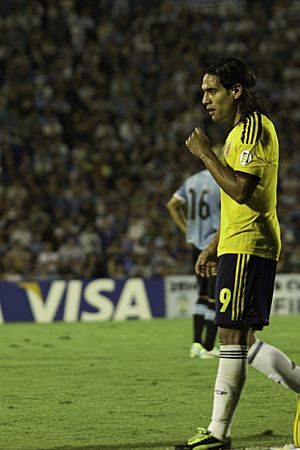
| Rank | Player | Goals | Caps | Average | Career |
|---|---|---|---|---|---|
| 1 | Radamel Falcao (list) | 36 | 104 | 0.35 | 2007–2023 |
| 2 | James Rodríguez | 29 | 116 | 0.25 | 2011–present |
| 3 | Arnoldo Iguarán | 25 | 68 | 0.37 | 1979–1993 |
| 4 | Faustino Asprilla | 20 | 57 | 0.35 | 1993–2001 |
| 5 | Luis Díaz | 19 | 64 | 0.3 | 2018–present |
| 6 | Freddy Rincón | 17 | 84 | 0.2 | 1990–2001 |
| 7 | Carlos Bacca | 16 | 52 | 0.31 | 2010–2018 |
| 8 | Teófilo Gutiérrez | 15 | 51 | 0.29 | 2009–2017 |
| Víctor Aristizábal | 15 | 66 | 0.23 | 1993–2003 | |
| 10 | Adolfo Valencia | 14 | 37 | 0.38 | 1992–1998 |
Competitive Records
FIFA World Cup
| FIFA World Cup Record | Qualification Record | ||||||||||||||||
|---|---|---|---|---|---|---|---|---|---|---|---|---|---|---|---|---|---|
| Year | Round | Position | Pld | W | D | L | GF | GA | Squad | Pos | Pld | W | D | L | GF | GA | |
| Not a FIFA member | Not a FIFA member | ||||||||||||||||
| Withdrew | Withdrew | ||||||||||||||||
| Did not enter | Did not enter | ||||||||||||||||
| Did not qualify | 3rd | 4 | 0 | 1 | 3 | 3 | 8 | ||||||||||
| Group stage | 14th | 3 | 0 | 1 | 2 | 5 | 11 | Squad | 1st | 2 | 1 | 1 | 0 | 2 | 1 | ||
| Did not qualify | 3rd | 4 | 1 | 0 | 3 | 4 | 10 | ||||||||||
| 3rd | 6 | 1 | 1 | 4 | 7 | 12 | |||||||||||
| 2nd | 4 | 1 | 3 | 0 | 3 | 2 | |||||||||||
| 3rd | 4 | 0 | 2 | 2 | 1 | 8 | |||||||||||
| 3rd | 4 | 0 | 2 | 2 | 4 | 7 | |||||||||||
| 3rd | 8 | 3 | 2 | 3 | 8 | 10 | |||||||||||
| Round of 16 | 14th | 4 | 1 | 1 | 2 | 4 | 4 | Squad | 1st | 6 | 3 | 2 | 1 | 6 | 3 | ||
| Group stage | 19th | 3 | 1 | 0 | 2 | 4 | 5 | Squad | 1st | 6 | 4 | 2 | 0 | 13 | 2 | ||
| 21st | 3 | 1 | 0 | 2 | 1 | 3 | Squad | 3rd | 16 | 8 | 4 | 4 | 23 | 15 | |||
| Did not qualify | 6th | 18 | 7 | 6 | 5 | 20 | 15 | ||||||||||
| 6th | 18 | 6 | 6 | 6 | 24 | 16 | |||||||||||
| 7th | 18 | 6 | 5 | 7 | 14 | 18 | |||||||||||
| Quarter-finals | 5th | 5 | 4 | 0 | 1 | 12 | 4 | Squad | 2nd | 16 | 9 | 3 | 4 | 27 | 13 | ||
| Round of 16 | 9th | 4 | 2 | 1 | 1 | 6 | 3 | Squad | 4th | 18 | 7 | 6 | 5 | 21 | 19 | ||
| Did not qualify | 6th | 18 | 5 | 8 | 5 | 20 | 19 | ||||||||||
| Qualification in progress | TBD | 16 | 5 | 7 | 4 | 19 | 15 | ||||||||||
| To be determined | To be determined | ||||||||||||||||
| Total | Quarter-finals | 6/20 | 22 | 9 | 3 | 10 | 32 | 30 | — | — | 186 | 67 | 61 | 58 | 219 | 193 | |
- 1.Played Intercontinental playoffs.
Copa América
Champions Runners-up Third place Fourth place
| South American Championship / Copa América Record | |||||||||
|---|---|---|---|---|---|---|---|---|---|
| Year | Round | Position | Pld | W | D | L | GF | GA | Squad |
| No national representative | |||||||||
| Not a CONMEBOL member | |||||||||
| Withdrew | |||||||||
| Fifth place | 5th | 6 | 1 | 1 | 4 | 7 | 25 | Squad | |
| Withdrew | |||||||||
| Eighth place | 8th | 7 | 0 | 2 | 5 | 2 | 19 | Squad | |
| 8th | 7 | 0 | 2 | 5 | 4 | 23 | Squad | ||
| Withdrew | |||||||||
| Fifth place | 5th | 6 | 2 | 0 | 4 | 10 | 25 | Squad | |
| Withdrew | |||||||||
| Seventh place | 7th | 6 | 0 | 1 | 5 | 10 | 19 | Squad | |
| Did not qualify | |||||||||
| 1975 | Runners-up | 2nd | 9 | 6 | 0 | 3 | 11 | 5 | Squad |
| 1979 | Group stage | 5th | 4 | 2 | 1 | 1 | 5 | 2 | Squad |
| 1983 | 7th | 4 | 1 | 2 | 1 | 5 | 5 | Squad | |
| Third place | 3rd | 4 | 3 | 0 | 1 | 8 | 3 | Squad | |
| Group stage | 6th | 4 | 1 | 2 | 1 | 5 | 4 | Squad | |
| Fourth place | 4th | 7 | 2 | 2 | 3 | 5 | 6 | Squad | |
| Third place | 3rd | 6 | 3 | 2 | 1 | 6 | 4 | Squad | |
| 3rd | 6 | 3 | 1 | 2 | 7 | 8 | Squad | ||
| Quarter-finals | 8th | 4 | 1 | 0 | 3 | 6 | 7 | Squad | |
| 5th | 4 | 3 | 0 | 1 | 8 | 4 | Squad | ||
| Champions | 1st | 6 | 6 | 0 | 0 | 11 | 0 | Squad | |
| Fourth place | 4th | 6 | 3 | 1 | 2 | 7 | 7 | Squad | |
| Group stage | 9th | 3 | 1 | 0 | 2 | 3 | 9 | Squad | |
| Quarter-finals | 6th | 4 | 2 | 1 | 1 | 3 | 2 | Squad | |
| 6th | 4 | 1 | 2 | 1 | 1 | 1 | Squad | ||
| Third place | 3rd | 6 | 3 | 1 | 2 | 7 | 6 | Squad | |
| Quarter-finals | 5th | 4 | 3 | 1 | 0 | 4 | 0 | Squad | |
| Third place | 3rd | 7 | 2 | 3 | 2 | 7 | 7 | Squad | |
| Runners-up | 2nd | 6 | 4 | 1 | 1 | 12 | 3 | Squad | |
| Total | 1 Title | 24/35 | 130 | 53 | 26 | 51 | 154 | 194 | — |
CONCACAF Gold Cup
| CONCACAF Gold Cup Record | |||||||||
|---|---|---|---|---|---|---|---|---|---|
| Year | Round | Position | Pld | W | D | L | GF | GA | Squad |
| Runners-up | 2nd | 5 | 2 | 1 | 2 | 5 | 7 | Squad | |
| Quarter-finals | 5th | 3 | 1 | 1 | 1 | 2 | 3 | Squad | |
| Semi-finals | 4th | 5 | 2 | 0 | 3 | 7 | 7 | Squad | |
| Total | Runners-up | 3/3 | 13 | 5 | 2 | 6 | 14 | 17 | — |
FIFA Confederations Cup
| FIFA Confederations Cup Record | |||||||||
|---|---|---|---|---|---|---|---|---|---|
| Year | Round | Position | Pld | W | D | L | GF | GA | Squad |
| Did not qualify | |||||||||
| Fourth place | 4th | 5 | 2 | 0 | 3 | 5 | 5 | Squad | |
| Did not qualify | |||||||||
| Total | Fourth place | 1/10 | 5 | 2 | 0 | 3 | 5 | 5 | — |
Head-to-Head Record
This table shows how Colombia has performed against other FIFA recognized teams.
Positive Record Neutral Record Negative Record
| Senior competition | Total | |||
|---|---|---|---|---|
| CONMEBOL Copa América | 1 | 2 | 5 | 8 |
| CONCACAF Gold Cup | 0 | 1 | 0 | 1 |
| Total | 1 | 3 | 5 | 9 |
Honours
Continental Titles
Regional Titles
- Central American and Caribbean Games
- Bolivarian Games
Friendly Tournament Wins
- Copa Centenario de Armenia (1): 1989
- Marlboro Cup (1): 1990
Awards
- FIFA Best Mover of the Year (1): 1993
- FIFA World Cup Fair Play Trophy (1): 2014
- Copa America Fair Play Award (1): 2024
Images for kids
-
Colombia at their first South American Championship in 1945
See also
 In Spanish: Selección de fútbol de Colombia para niños
In Spanish: Selección de fútbol de Colombia para niños
- Colombia Olympic football team
- Colombia national under-20 football team
- Colombia national under-17 football team
- Colombia national under-15 football team
- Colombia national futsal team
 | Leon Lynch |
 | Milton P. Webster |
 | Ferdinand Smith |


